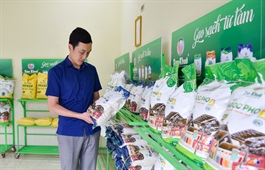Farm profits threatened by soaring fertiliser prices
Farm profits threatened by soaring fertiliser prices
Fertiliser prices have been skyrocketing since last year, crippling many farmers.

Tran Linh, a farmer in Dak Lak Province, was concerned that rising fertiliser prices would render all his agricultural efforts wasted.
Normally, he spends VND2 million (US$87.6) for each sao (unit of area) of his paddy fields, not including labour costs, to earn VND7 million ($306.6) per sao.
This year, due to higher fertiliser prices and low rice prices, the costs rose to VND3 million per sao while the revenues fell to VND5 million per sao, dragging down his profits.
“It’s difficult to make ends meet with such meagre income,” said the rice farmer.
Ha Trang, a farm owner in Lam Dong Province, was also worried about the high cost of fertilising the soil.
She said that soil nutrition materials doubled in price in just one year.
If left unchecked, the rise in fertiliser prices, coupled with high petroleum prices and high labour costs, would strip away all her farming profits.
“NPK fertiliser stayed at around VND800,000 per bag last year. Now, it is twice the price, at VND1.5-1.7 million per bag. I’m going to suffer losses soon,” said the coffee farm owner.
Not only rice and coffee farmers are being hard-hit by high fertiliser prices, but also dragon fruit farmers.
Dragon fruit farmers have been selling their produce at a loss since China tightened its COVID-19 preventive measures.
Now, mounting fertiliser bills are adding to their woes.
Many dragon fruit farmers in Binh Thuan Province said that they were likely to go bankrupt if the situation did not improve.
“Dragon fruits have been sold at a dirt-cheap price for two years. Meanwhile, fertiliser prices have been increasing multifold. It seems certain that dragon fruit farmers will become heavily indebted after this season,” said farmer Nguyen Thi Sen.
Parts of fertiliser used in Viet Nam are imports so its fertiliser prices normally move in line with the world market’s prices.
The recent drop in global supply has been pushing up the material prices worldwide, sending domestic prices through the roof.
China, one of the largest fertiliser suppliers in the world, imposed export restrictions on 29 types of fertiliser in mid-October last year.
Russia followed suit in November by announcing six-month quotas on its nitro-derived fertiliser exports.
Western countries fuelled the situation by imposing sanctions against Belarus, a country that accounts for one-fifth of global potash supply. Potash is a key ingredient in potash-derived fertiliser.
It is also worth mentioning that some European fertiliser plants had to halt or curtail production owing to ballooning natural gas costs, further tightening the market.
Yara, the largest fertiliser producer in Europe, said in mid-September that it would reduce fertiliser output of its factories by 40 per cent on grounds of surging costs.
German chemical giant BASF did likewise later by cutting production in Antwerp and Ludwigshafen.
Vietnamese fertiliser importer and supplier Vinacam forecasted that DAP fertiliser prices would continue to rise until China gets its exports back to normal.
Regarding MOP standard fertiliser and NPK 16-16-18 fertiliser, their prices are expected to remain stable due to abundant reserves.
Meanwhile, MOP granular fertiliser is forecast to continue to go up in price, staying at around VND17-18 million per tonne in March 2022.
In contrast, urea fertiliser prices are projected to fall slightly and are unlikely to bounce back, even in the main rice-growing season.
In response to the continuously soaring prices, the Ministry of Agriculture and Rural Development has issued Directive No.653, urging authorities to instruct farmers how to efficiently use fertiliser to reduce farming costs.
Farmers have been called on to replace inorganic fertiliser with that made from domestic waste and compost, and organic fertiliser to cut costs further.
The ministry also suggested the widespread adoption of various advanced farming techniques to boost productivity and reduce fertiliser usage, including the System of Rice Intensification and organic farming.
According to the General Department of Customs, Viet Nam imported around 322,700 tonnes of fertiliser in January 2022 with an average price of $476 per tonne.
Fertiliser products from China accounted for 42.6 per cent of total fertiliser imports, staying at 137,430 tonnes.
Russian fertiliser came next with 53,773 tonnes (19.3 per cent) and was followed by Belarusian fertiliser with 30,815 tonnes.


























